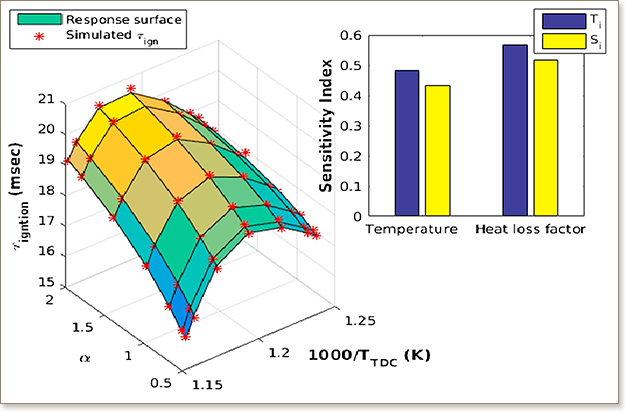Impact of thermodynamic properties and heat loss on ignition of transportation fuels in rapid compression machines


Rapid compression machines (RCM) are extensively used to study autoignition of a wide variety of fuels at engine relevant conditions. Fuels ranging from pure species to full boiling range gasoline and diesel can be studied in an RCM to develop a better understanding of autoignition kinetics in low to intermediate temperature ranges. In an RCM, autoignition is achieved by compressing a fuel/oxidizer mixture to higher pressure and temperature, thereby initiating chemical reactions promoting ignition. During these experiments, the pressure is continuously monitored and is used to deduce significant events such as the end of compression and the onset of ignition. The pressure profile is also used to assess the temperature evolution of the gas mixture with time using the adiabatic core hypothesis and the heat capacity ratio of the gas mixture. In such RCM studies, real transportation fuels containing many components are often represented by simpler surrogate fuels. While simpler surrogates such as primary reference fuels (PRFs) and ternary primary reference fuel (TPRFs) can match research and motor octane number of transportation fuels, they may not accurately replicate thermodynamic properties (including heat capacity ratio).
This non-conformity could exhibit significant discrepancies in the end of compression temperature, thereby affecting ignition delay (τign) measurements. Another aspect of RCMs that can affect τign measurement is post compression heat loss, which depends on various RCM parameters including geometry, extent of insulation, pre-heating temperature etc. To, better understand the effects of these non-chemical kinetic parameters on τign, thermodynamic properties of a number of FACE G gasoline surrogates were calculated and simulated in a multi-zone RCM model. The problem was further investigated using a variance based analysis and individual sensitivities were calculated. This study highlights the effects on τign due to thermodynamic properties of various surrogate fuels and differences in post compression heat loss over low, intermediate and high temperature region.
DOI: 10.1016/j.fuel.2018.01.030

"KAUST shall be a beacon for peace, hope and reconciliation, and shall serve the people of the Kingdom and the world."
King Abdullah bin Abdulaziz Al Saud, 1924 – 2015
Thuwal 23955-6900, Kingdom of Saudi Arabia
© King Abdullah University of Science and Technology. All rights reserved